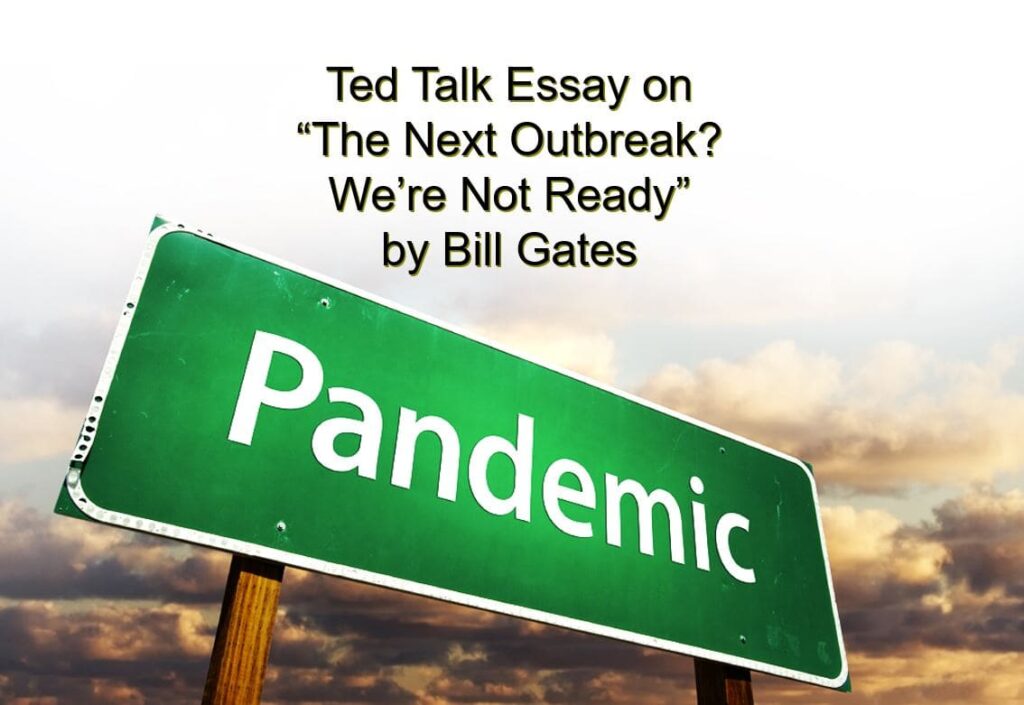A global pandemic always seemed like an improbable occurrence until the COVID-19 virus hit and the world came to a stand-still. The pandemic continues to tear the global health system apart, as it is unable to handle the high infection rates and treatment of this disease. In this Ted Talk essay on “The Next Outbreak? We’re Not Ready” by Bill Gates, the author focuses on the level of preparedness and response to an outbreak on a global scale. The poor state of global outbreak response, as surprisingly predicted by Bill Gates five years before a worldwide outbreak hit, is reflected in personal experiences, and this video portrays the importance of this information in contagion containment and its application in scrutiny of pre-existing systems.
The Main Theme of the Video
The main point of the video is to address the unsettling state of outbreak unpreparedness around the globe. According to Eissa, there was a pre-existing deficit in pandemic preparedness before the COVID-19 pandemic (1). It is due to the weak structural organization of the global health expenditure system that does not account for significant occurrences, such as contagion epidemics, that require vast resources. To improve the state of the health sector and fix the flaws that were brought to light post-pandemic, there needs to be more investment of resources and research into preparedness for global outbreaks.

Personal Experience
Personal experiences related to this presentation on outbreak unpreparedness materialized when COVID-19 hit last year. Health services became inaccessible during the initial waves of the outbreak due to precautions by the hospitals to restrict access to patients who were not critically ill. In the United States, health facilities had to minimize outpatient visits and surgeries by half to absorb the hefty load of COVID-19 patients in emergency rooms and intensive care units (Gray par. 3). It was also due to the safety protocols, such as social distancing and the high risk of exposure to the virus in hospitals, that warranted the incorporation of these policies. Hospitals need to find a way to increase the reach of patients requiring outpatient care during outbreaks so that the ailments of all people, regardless of their magnitude, are met during an outbreak.
Importance
The information articulated in the video has proven critical to the management and containment of a disease outbreak. There is still a huge threat of another pandemic in the future due to approaching factors, such as the rapidly increasing world population, that are encroaching on animals’ ecological environment (Koley and Dhole 212). Understanding these challenges can be enriched by exploring explication essay examples in related contexts. This aspect increases the risk of disease-causing pathogens and zoogenic contagions that can be transmitted from animals to humans, leading to unknown global viral infections. Therefore, global governments should learn from the unpreparedness of the COVID-19 pandemic and apply stringent measures, as suggested in this video, to avoid reoccurrence in the future.
Applying the Information
The information revealed in this video can be applied to analyze the current state of preparation for an outbreak. For instance, following the Ebola outbreak in West Africa, there was no existing response system to the outbreak, leading to more infections and deaths since the World Health Organization did not have funding to respond to epidemics (Gates 2:50-02:59). It was due to a lack of epidemiologists and medical experts who would have analyzed the disease and derived treatment options sooner. Through this analysis, the global response system to such an epidemic can be scrutinized and enhanced to improve its efficiency.
Surprising Fact
Bill Gates predicted the healthcare’s outbreak unpreparedness of COVID-19 in this TED talk five years before its actualization. Gates predicted the extent of occurrence of an outbreak, such as COVID-19, while drawing reference from the Spanish flu in 1918, where over 30 million people succumbed to the virus (04:30-04:50). In this case, contagion precautionary measures, such as mass recruitment and training of specialized outbreak response teams, as outlined in the video, should be adopted. Hence, protocols should be designed and implemented in preparation for an outbreak, as prescribed in the presentation, to ensure that the response to the next outbreak significantly reduces the chances of global disaster.
Summing Up
This research has depicted the significance, relevance, and utilization of information on outbreak preparedness. With the main aim of addressing the poor state of outbreak preparedness around the globe, Bill Gate’s speech portrays the condition of the response system, assesses its flaws, and recommends transitions that will equip the globe with more efficient responses to potential epidemics. Through analysis of the information, policies, protocols, and research, it should be spearheaded to improve the globe’s degree of preparedness for a viral disease outbreak.
Works Cited
Eissa, Noura. “Pandemic Preparedness and Public Health Expenditure.” Economies, vol. 8, no. 3, 2020, pp. 1-17, doi:10.3390/economies8030060.
Gates, Bill. “The Next Outbreak? We’re Not Ready.” TED Talks, 3 Apr. 2015, www.ted.com/talks/bill_gates_the_next_outbreak_we_re_not_ready?language=en#t-287535.
Gray, Dee. “The Lasting Impacts of COVID-19 on the Health Care System.” Texas A&M Today, 22 Apr. 2020, today.tamu.edu/2020/04/22/the-lasting-impacts-of-covid-19-on-the-health-care-system/.
Koley, Tapas Kumar, and Monika Dhole. The COVID-19 Pandemic: The Deadly Coronavirus Outbreak. Routledge, Taylor & Francis Group, 2021.


